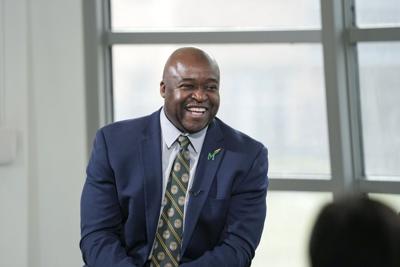RICHMOND — George Mason University won't apologize for the university's work on DEI, his lawyer said in a letter to the college's board of visitors.
The president's response comes days after President Donald Trump's administration announced it had found George Mason committed acts of racial discrimination and demanded an apology from Washington.
The Mason president's attorney says the Department of Education conducted a slipshod investigation, mischaracterized the Mason president's statements and omitted the university's work in recent years to revise its DEI practices. The investigation was "cut short" and resulted in "a very incomplete fact-finding process," said Douglas F. Gansler, a lawyer for the Mason president.
Apologizing would require Washington to admit to conduct that never happened, he said.
People are also reading…

George Mason University President Greg Washington
In July, days after University of Virginia president Jim Ryan resigned under pressure from the Trump administration, the Education Department's Office of Civil Rights said it would also investigate George Mason in Fairfax County. Professors had accused university leadership of illegally using race as a factor in hiring and promoting employees. Last week, the Education Department said it had found Mason did indeed commit illegal discrimination and Washington would need to personally apologize.
In Gansler's response, he maintained Mason never discriminated against an applicant and that federal officials have not tried to accuse the university of making any discriminatory hire.
George Mason did establish a strategic plan for diversity, equity and inclusion, as required by a law then-Gov. Ralph Northam signed in 2021. The university assembled a task force for "Anti-Racism and Inclusive Excellence" meant to make recommendations to address implicit bias, discrimination and other equity issues.
While Washington said at the time that George Mason should "reflect the rich diversity of our students," he also pushed back, saying a proposal from the task force went too far. The university's mission "is to hire the best faculty and administrators, period," Washington said at the time, according to the letter. "The type of target hiring of minorities" the task force had proposed "is both prejudicial and illegal." He added that supporting DEI "is not code for establishing a quota system."
Federal officials pointed to a question Washington posed in 2021 when discussing two equally deserving candidates for a position. If one candidate adds to the university's diversity, "why couldn't that candidate be better, even if that candidate may not have better credentials than the other candidate?"
Gansler said the president posed this question to provoke conversation within the school community and that the comment is meant to consider how two equally qualified candidates can contribute differently to campus. The lawyer added that the concept of diversity goes beyond race and gender and includes sexuality, personality, life experiences and other factors.
Another claim from Trump officials was that a search committee for Mason's College of Humanities and Social Sciences said that when making a hire, it considered an applicant's overall scholarship first, whether the candidate meets diversity goals second and the applicant's primary area of research third. Gansler argued that a university can legally consider a candidate's diversity as long as the hiring complies with nondiscrimination laws. The lawyer added that Washington wasn't directly involved in evaluating candidates and that the university never discriminated in a hiring decision.
Federal officials also claimed that George Mason's website stated that the university could waive the competitive search process if it finds an opportunity to hire a candidate who advances the university's diversity. But this language, Gansler said, predates Washington's arrival at George Mason and "is not language that we can find on any current or discontinued university web page."
The university has a policy allowing hiring managers to forgo the competitive hiring process, but only in rare instances, and administrators must explain the need to abandon the search process. An example is for a high-profile teaching professional with a unique skillset, the university's website says.
Gansler said that George Mason was among the first universities to rework its DEI practices, having started before Trump took office. The university ended its Anti-Racism and Inclusive Excellence initiative, eliminated six diversity-related positions and restructured 11 others. After Trump became president and issued an executive order to eliminate DEI on college campuses, Mason removed its DEI office and replaced it with the "Office of Access, Compliance and Community." Administrators gave the board of visitors a report in April explaining how they had modified DEI practices at the school.
But the Department of Education ignored this work, Gansler said. For federal officials to single out George Mason for alleged discrimination "borders on the absurd," the lawyer added.









